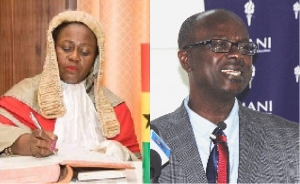A US-based Ghanaian lawyer and scholar, Prof Stephen Kwaku Asare, has asserted that the legal vacation taken by justices of the superior courts in Ghana, including the Supreme Court and the Appeals Court, has outlived its purpose.
In a post shared on Facebook on August 29, 2024, Prof Asare, who is widely known as Kwaku Azar, said that the concept of a legal vacation was instituted during the colonial era to allow judges, who were all white, to travel to their home country, Britain.
He also pointed out that it does not make sense for the judges to go on a two-month break when there are tons of backlogs of cases they have not heard yet.
“The superior court judges are currently on a two-month vacation. As a result, lawyers who practice before them are also compelled to take a break, and their clients' cases — whether involving their life, liberty, livelihood, or even lighter matters — must also be put on hold.
“These vacations trace their origins back to colonial times when judges had to sail back to Britain, and this practice has become as entrenched as the wearing of gowns and horse-hair wigs. Yet, year after year, we lament over case backlogs, trial delays, and other inefficiencies in our judicial system,” he wrote.
The academic also stated that legal vacations are unconstitutional on at least five constitutional grounds:
He went on to list the grounds as follows:
1. Unconstitutional Usurpation: Court holidays are unconstitutional as they usurp Parliament's exclusive power to declare public holidays under the Public Holiday Act, violating Article 93(2).
2. Discrimination Against Lower Courts: Court holidays discriminate against the lower courts, violating Article 17, which guarantees equality before the law.
3. Restriction of Access to Justice: Court holidays unduly restrict access to justice, infringing on the fundamental human right to access the courts as guaranteed by Article 14.
4. Violation of the Right to a Speedy Trial: Court holidays negatively impact the right to a speedy trial, in violation of Article 19(1).
5. Infringement on Economic Rights: Court holidays infringe on the economic rights of lawyers by forcing them into a vacation, thereby restricting their ability to practice law and earn a livelihood during these periods, violating Article 24.
Meanwhile, the Chief Justice, Justice Gertrude Araba Esaaba Sackey Torkornoo, has rejected calls for the cancellation of the legal vacation provided under the procedure rules of Superior Courts.
Speaking at the end of the legal year party organized by the Greater Accra Bar on July 31, 2024, Justice Torkornoo dispelled all the concerns of lawyers and staff of the Judicial Service of any consideration by herself or the Rules of Court Committee chaired by her to scrap the legal vacation.
She explained that the vacation was important because lawyers and staff of the judicial service need to rest, thelawplatform.online reports.
The Chief Justice further explained that physiological considerations underpin the provisions providing for legal vacation in the procedure rules.
She likened the legal vacation to the vacation of school, which is very important because students need to rest their bodies and minds and re-invigorate for more work.
About the legal vacation:
Order 79 Rule 4 of C.I. 47, High Court Civil Procedure Rules, which stipulates the timelines for legal vacation and has repetition by way of wording in Rule 61 of C.I. 19, Court of Appeal Rules, and Rule 82 of C.I. 16, Supreme Court Rules, reads as follows:
Rule 4—Vacations
Subject to rule 1 (1) the following periods shall be observed in the High Court as vacations:
(a) the period commencing on the Tuesday immediately following Easter Monday in each year and ending on the Friday immediately following;
(b) the period commencing on 1st August in each year and ending on 30th September in the year; and
(c) the period commencing on 23rd December in each year and ending on 6th January in the next year.
The Chief Justice, however, has powers under the rules to designate a court to sit despite the provisions requiring the observation of vacations.
View his post below:
BAI/AE
Watch the latest episode of Everyday People below:
Ghana’s leading digital news platform, GhanaWeb, in conjunction with the Korle-Bu Teaching Hospital, is embarking on an aggressive campaign which is geared towards ensuring that parliament passes comprehensive legislation to guide organ harvesting, organ donation, and organ transplantation in the country.













